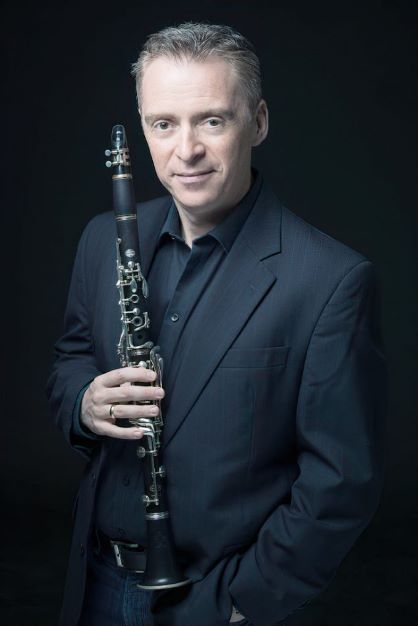CONVERSATION with Ilya Shterenberg
Clarinetist, Former SAS MEMBER and Musician with the MOSAS PERFORMANCE FUND
By JASMINA WELLINGHOFF, Editor
How long have you been with the now defunct San Antonio Symphony?
Twenty-two years, since 2000.
The Symphony has had a number of serious crises before and after 2000, why was the crisis of 2022 the one that led to the permanent closing of SAS?
I don’t quite know, honestly. It is such a complicated issue. You can ask three people and get three different answers. I can speculate and I have my feelings about who is wrong and who is right, but that’s it. What happened, happened, and it cannot be changed. What can bring change is looking forward and trying to build something new. For that to happen, all of us in the city, need to get involved, and we all need to cooperate. I hope that happens.

What are you doing this summer?
Oh, very busy! Let’s see… I went to Chicago to play at the North Shore Music Festival with my dear friend Vadim Gluzman, a wonderful violinist, (and fellow Ukrainian). I stayed there a week. I also went to Oregon to play at the Britt Music & Arts Festival. My wife is the general manager of that festival orchestra right now and she got that job because of the situation here. (Renia Shterenberg played with SAS,and is also the executive director of the Olmos Ensemble). In addition, I just played for the Cactus Pear Music Festival here for two weeks. And I’ll soon be leaving for Baltimore to play with the orchestra there. From Baltimore, I go to Columbus, playing with the orchestra there, and so forth.
Are you looking for another stable job?
Of course! I think most of us are. But it’s not that easy. It’s very competitive and rather complicated. Traditionally, there are more positions open for string players simply because there are more of them in an orchestra. But I also teach privately.
How was the Cactus Pear Festival?
Oh, it’s always great. This was its 26th year and I have been privileged to play at the festival since pretty much the beginning. Ryo (the new artistic director of the CPMF) is a friend; we have played together many times. I am very much looking forward to seeing what he will bring to the festival.
Tell us about your journey. How did you become a musician?
That’s kind of a fun story. I started with the piano when I was four. I studied the piano for the next eight years of my life. Then, when I was about 12, the question of my going into the armed forces started coming up. All males were drafted into military service in Ukraine by age 18. So, that was looming on the horizon. My father knew that I couldn’t play in an army band on the piano, so I had to change instruments. That’s how I became a clarinetist. There was no war in Ukraine then but Soviet soldiers were sent to Afghanistan and other places. This was in the 80s.
Where in Ukraine did you grow up?
The city of Zhytomyr, about 2 hours from Kyiv. My clarinet teacher was really instrumental in my becoming a musician. He truly opened my eyes to the world of professional music. I will forever be grateful. His name is Boris Fisherman, and he’s still alive, living in Germany now.
Your last name sounds Germanic. How much do you know about your ancestors?
It has some Germanic roots, I suppose. I was born and raised in Ukraine. I don’t really know anyone farther down the line than my grandparents. In recent years, lots of people have started researching their family roots, and all kinds of Shterenbergs keep popping up. There was a very famous, Ukrainian-born painter in Russia named David Shterenberg in the late 1800s, I think. I have no idea if we are connected or not. Recently, my dad found out that there’s a Shterenberg Castle somewhere in Hungary and there was a Shterenberg crest, apparently.
When did you leave Ukraine and why?
We emigrated – my entire family, my parents, my sister and I, in 1989. We landed in Dallas where my parents still live. We left for the opportunity to have a better life. For us, it was relatively easy to leave. Our process took about two years, if I remember correctly. I was 18 when I left. Back then, I felt like the emigration was an adventure. I was looking forward to it at first. The nostalgia and homesickness started later on. I do remember being surprised by how big the cars were in Dallas, like boats.
My first job in America, was working at the grocery store chain called Tom Thumb. I played cocktail-hour piano once a week for several hours. The grocery store still exists in Dallas. Shortly after, a position in the deli department opened, which I joined to get more hours. That’s when I really started learning the language and culture – attending to the salad bar and slicing deli meats.
When you lived in the Ukraine, were there any issues between the Russians and the Ukrainians?
No, no, it was still the Soviet Union. People did not resent the Russians. Everyone spoke both Russian and Ukrainian. My first language was Russian.
So, how do you feel watching the hostilities taking place now?
Oh, it’s a disaster. What can you say? What can anyone say? It’s a bloody mess. I still had a cousin there, a businessman, but he was able to leave. He’s in Amsterdam now. It’s a mess. It will take generations to clean it up. My children’s children will feel the effects of this war. Buildings can be rebuilt but human feelings linger much longer, for generations.
What is your most cherished memory of Ukraine?
I can’t pick just one… It was the place of my childhood and teenage years. I have many different memories: places, people, things, sights & sounds, they are all very special to me in different ways, as memories of my upbringing.
Are your children interested in music?
Yes, they both play instruments. My older played the clarinet. He’s at Boston University, majoring in computer engineering, with a minor in music. He still plays piano and guitar and studies music. My 15-year-old plays violin. He plays in his high school and with Youth Orchestras of San Antonio.
Are you a member of a smaller chamber ensemble?
Yes, I am a member of the Olmos Ensemble In fact, we are having concerts on three Sundays in August: Aug. 14, 21 and 28. We do three concerts in August because, traditionally, so little is happening in August. People always seem to enjoy those August afternoon concerts. The season then continues in September and beyond. However, things are changing. Our oboist just got a new job in Florida, and our concert master now lives in Chicago, though he will be here for the concerts. Mark, our artistic director, just got an offer to play for a year in Houston, and we lost our hornist to the Oregon Orchestra.
People are leaving. This is the hardest part about rebuilding an orchestra. Trying to attract new musicians is going to be hard. Everybody across the U.S. and the world knows what happened with the Symphony here.
Do you believe that the Tobin Center will be willing to take part in rebuilding a professional orchestra in San Antonio?
I don’t know for sure but they seem to be completely out of it. They have their own business model, and they are doing quite well. And yet, the idea behind the Tobin, was to provide a performance hall for local organizations – the Symphony, Opera and the Ballet. I hope we will be reunited and be friends again. We, as an orchestra, belong in the Tobin Center.
Will MOSAS Performance Fund be a replacement for the San Antonio Symphony?
In essence, MOSAS is the San Antonio symphony. What is a symphony? First and foremost, the musicians. So MOSAS and the MOSAS Performance Fund, which were started to give us some opportunities to play and be relevant, find themselves in the position of regrowing something from that planted seed.
———————————
